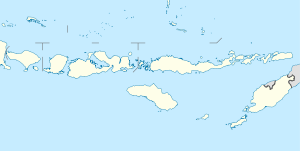Amabi Oefeto
| Kecamatan Amabi Oefeto Amabi Oefeto District
|
|
|---|---|
 |
|
| Basic data | |
| Country | Indonesia |
| province | East Nusa Tenggara |
| Administrative district | Kupang |
| Seat | Fatukanutu |
| surface | 140.2 km² |
| Residents | 9109 (2017) |
| density | 65 inhabitants per km² |
| ISO 3166-2 | ID-NT |
Coordinates: 10 ° 8 ′ S , 123 ° 55 ′ E
Amabi Oefeto is an Indonesian district ( Kecamatan ) in the west of the island of Timor .
geography
| "Village" (Desa) | Administrative headquarters | surface | Residents | Population density |
|---|---|---|---|---|
| Kuanheum | Kuanheum | 17.25 km² | 1357 | 78.67 |
| Fatukanutu | Fatukanutu | 29.38 km² | 2097 | 71.37 |
| Kairane | Kairane | 24.00 km² | 645 | 26.87 |
| Niunbaun | Canino | 24.00 km² | 697 | 29.04 |
| Raknamo | Raknamo | 20.51 km² | 2915 | 142.13 |
| Fatuteta | Fatuteta | 20.05 km² | 707 | 35.26 |
| Oefeto | Oefeto | 5.0 km² | 691 | 138.2 |
Location in East Nusa Tenggara Province
|
The district is located in the south of the government district of Kupang in the province of East Nusa Tenggara (Nusa Tenggara Timur) . To the north is the Fatuleu district , to the north-west of East Kupang (Kupang Timur) , to the south of Amarasi and to the south-east of Ostamarasi (Amarasi Timur) .
Amabi Oefeto has an area of 140.19 km² and is divided into the seven Desa Kuanheum , Fatukanutu , Kairane , Niunbaun , Raknamo , Fatuteta and Oefeto . The administrative headquarters are in Fatukanutu. The territory lies at an altitude of about 150 m to 350 m . As in Timor, the tropical climate is divided into a rainy and a dry season .
flora
The landscape is shaped by meadows overgrown with bamboo plants and trees.
Residents
In 2017, Amabi Oefeto had 9,109 inhabitants. 4609 were men, 4500 women. The population density was 64.98 people per square kilometer. 1479 people professed to be Catholic, 7558 were Protestants and 72 people were Muslim. There were three Catholic and 22 Protestant churches and a mosque in the district.
history
The inhabitants of the empire of Amabi and their ruling family are said to originally come from the municipality of Ermera in what is now the neighboring country of East Timor . The tribe was led by two brothers. After some of the empires in the east were subjugated by the Portuguese , the Amabi fled west. Other traditions give as origin Molo in West Timor and as enemies, the Amanuban and Oematan. A brother, Loe Mananu, settled in Amabi Oefeto, which became a border post against enemy empires. The other brother went to Kupang , at that time the only base of the Dutch East India Company (VOC) on the island. There the Amabi became one of the “five loyal allies” of the Dutch in 1665 . Amabi Oefeto was larger in area, but less populated than the actual Amabi.
The line of rulers of Amabi Oefeto died out, the current heir of the rulers of Amabi has his residence in Amabi Oefeto. Fettor Gideon Amabi ("Fettor" is a title) still has a great influence on the population today. He was elected to the district parliament in the first direct election in 2004. Fettor Gideon Amabi and his Javanese wife are Protestant Christians. Crown Prince of the dynasty is their son Muda Israel Amabi .
Economy, infrastructure and transport
Most of the district's residents make a living from agriculture. Cattle (13,241), horses (32), pigs (9,812), goats (2,304), chickens (18,023) and ducks (157) are kept as pets. Corn is grown on 737 hectares, rice on 153 hectares, cassava on 0.03 hectares and peanuts on 0.08 hectares. There are also banana, mango, papaya, various beans, eggplant, chili and tomatoes, coconuts, cocoa, kapok , light nuts , Arecanüsse , coffee, cashew nuts and vanilla. 2580 hectares are forested. Mainly teak is extracted here. Sand and various stones are also mined.
In Amabi Oefeto there are ten primary schools, five middle schools, one secondary school and one vocational school in Kuanheum. A community health center ( Puskesmas ) in Fatukanutu and six medical care centers ( Puskesmas Pembantu ) are available for medical care . A doctor and nine midwives work here.
22.5 kilometers of roads are paved. 110.85 kilometers of roads are covered with gravel. Simple clay slopes in the district have a length of 48.5 kilometers. Public transport is operated by 15 pick-ups , two trucks and 76 motorcycles.
Web links
- Statistical data from Amabi Oefeto District 2018 (Indonesian).
Individual evidence
- ↑ a b c d e f g Kecamatan Amabi Oefeto Dalam Angka 2018 , accessed on November 3, 2018.
- ↑ a b Royal Timor: Amabi ( Memento from January 29, 2009 in the Internet Archive )
- ↑ Hans Hägerdal: Rebellions or factionalism? Timorese forms of resistance in an early colonial context, 1650-1769. limited preview in Google Book search.
